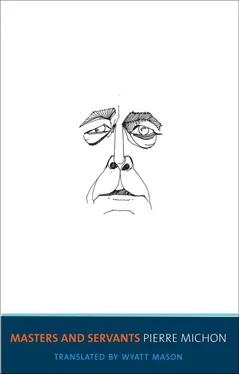Pierre Michon - Masters and Servants
Здесь есть возможность читать онлайн «Pierre Michon - Masters and Servants» весь текст электронной книги совершенно бесплатно (целиком полную версию без сокращений). В некоторых случаях можно слушать аудио, скачать через торрент в формате fb2 и присутствует краткое содержание. Год выпуска: 2013, Издательство: Yale University Press, Жанр: Современная проза, на английском языке. Описание произведения, (предисловие) а так же отзывы посетителей доступны на портале библиотеки ЛибКат.
- Название:Masters and Servants
- Автор:
- Издательство:Yale University Press
- Жанр:
- Год:2013
- ISBN:нет данных
- Рейтинг книги:3 / 5. Голосов: 1
-
Избранное:Добавить в избранное
- Отзывы:
-
Ваша оценка:
- 60
- 1
- 2
- 3
- 4
- 5
Masters and Servants: краткое содержание, описание и аннотация
Предлагаем к чтению аннотацию, описание, краткое содержание или предисловие (зависит от того, что написал сам автор книги «Masters and Servants»). Если вы не нашли необходимую информацию о книге — напишите в комментариях, мы постараемся отыскать её.
Masters and Servants — читать онлайн бесплатно полную книгу (весь текст) целиком
Ниже представлен текст книги, разбитый по страницам. Система сохранения места последней прочитанной страницы, позволяет с удобством читать онлайн бесплатно книгу «Masters and Servants», без необходимости каждый раз заново искать на чём Вы остановились. Поставьте закладку, и сможете в любой момент перейти на страницу, на которой закончили чтение.
Интервал:
Закладка:
Sure, Roulin was still drinking; but it didn’t help the way it used to. It no longer produced this desirous, violent body that the mad excesses of youth incite, this pure glory made flesh; Augustine is as old as the hills, and even the oyster girls — their sidelong glances, their white arms — if by chance or blindness they mistake you for a sultan, you would lay your hands on them in vain: nevertheless, you look at them with the same eyes you had in Lambesc, and their bodies are the same, heavy, prodigious. It seems that all the friends you drink with have changed, they’ve become inattentive, tactless; they no longer deign to see that beneath the postal cap something of a prince is singing and making intelligent remarks; moreover, maybe the prince speaks less willingly; there are too many things in the world that the postman hasn’t understood, that he knows he’ll never understand, which, therefore, the prince will no longer discuss. And on every 14th evening of July seemingly begun in good spirits — new uniform all polished, settled between the trumpets and the tricolor, the zouaves and the Algerian infantrymen, the blue sky — these nights of the taking of the Bastille you have nothing at all and end up sitting alone at a table in a bistro near the port with the black sea before you, the friends who left you to your ramblings, the young toughs who look at you and laugh with the oyster girls, the white that runs through your beard and the new uniform that you’ve stained, and when angrily you rise, when you push a chair and it falls, it’s no longer revolt, it’s no longer a down payment on the republic to come, it’s the republic itself falling in this chair that you see through your stupor and something close to tears, final but somehow resembling happiness — the republic is delectably lost, fallen there, into the past; when you come home after midnight, you’re just an old sot; and on an obscure back road where you stop to catch your breath, you see fireworks exploding suddenly up there like Vincent’s dahlias, and you wonder, what hands gather them? What celestial herd grazes them? And then you weaken, like an old woman you say to yourself that Vincent is in the sky You speak to him.
One day, as you might expect, van Gogh came back. It wasn’t from some heart of darkness.
It’s evening. Roulin has a little garden fairly far from his house, off by the wooded outskirts, here filled with tomatoes and over there some agaves, toward Estaque or Cassis; he’s coming back to eat and he takes to the incline of his street, rue Trigance for example, toward la Vieille Charité; his back is to us, tired, something in his hand, peppers or endive; he’s still imposing, but far more crooked than when he was pestering the fanatic with muzhiklike cabrioles on the edge of Arles. A young man who is waiting there, in a wine seller’s or under an awning, watches him approach, and his face lights up as though he knows him. But Roulin has never seen this citizen before. The other moves toward him; he has a mimosa jacket and a little mustache, but it’s not Armand; on his head is the inevitable steep stovepipe; he takes his hat in his hands; with a curious respect, he says a few words to the postman; at that moment, we don’t see the postman’s eyes, but we know that a glimmering flame dances there, because his shoulders straighten unfatigued with an air of exclamation, of gaiety that lifts his arms, opens his hands; he shows him that his house is up the road a piece, but the other already knows; together, they head up the bit of road that remains, the elegant one still with hat in hand, Roulin still wearing his cap; at the door he moves to the side — enter my prince — the young man climbs the stairs, he’s upstairs. They’re in the kitchen.
I want to see and hear their first conversation, in this kitchen visited and touched, for the first time, by eyes other than those of his fellow postal workers, those old nostalgic radicals from the Commune who came there to reminisce, to blaspheme; or even the eyes of Mother Roulin’s neighbors, cheerful kids or old women with whom she’d go to market; but the young man wasn’t looking at their kitchen because the Roulins were well liked, because they were despised, envied, or even because he wanted to chat with them and enjoy their company; his stare was the old, absent, clouded look of the prodigal son returned after ten years, after they had moved, and so he figures that, before, the buffet must have been there, and the chromo too, although he can’t remember it, because now it’s yellowed and dog-eared, but not this brand-new birdcage; and, no, not this bird; and Roulin understands this, barely; but that his kitchen was being scrutinized as something enormous and ancient, seen from its base, Egypt’s pyramids — this Roulin doesn’t understand. It doesn’t matter: because what he does see clearly, what he recognizes with a blinding clarity and an extreme joy, what he hasn’t seen in so long that he thought perhaps he had dreamt it, is the way the young man places himself in front of his portrait — the one that makes him look like Nepomucen in the celestial fields — the one Vincent had given him, and high time he said it, for whatever it’s worth; so the young man stood there, the black hat held firmly in his hands before him, unshakable, his shoulders perfectly upright as if standing at attention before a highly decorated officer whom, of course, one would not be able to see; he remains there, on his feet, as if at the bedside of a dead man, and even so there’s a tension in his lips, around his eyes, that’s both ferocious and deliberate, as if upon this little framed surface there were simultaneously represented twenty kilometers of fields leading to the foothills of the Alps — thus to the end of the Earth — as well as, right within reach, a beautiful woman without shame, calling to him, about to step out from the canvas and be touched from head to toe; and nothing in it tolerant, nothing unconvinced, instead, a nonsensical intolerance and an equivalent certitude, as when remembering Gambetta’s fiery rhetoric, as when you want a woman: that was how Monsieur Paul had looked at the paintings, that was how Monsieur Vincent had looked at Monsieur Paul’s paintings. So this way of seeing still exists. Roulin wants to jump up, to talk a lot, but he doesn’t, he understands that it’s tiresome, and besides, he barely knows this young man. Here’s Mother Roulin, who was out running errands; the elegant fellow seems to recognize her as well, and with good reason; and before he can say three words, leaning gently forward as one does in society, his stovepipe pressed indifferently to him, Roulin announces eagerly, “He’s interested in Monsieur Vincent,” and more excitedly: “He saw our portraits in Paris.”
They offer him something to drink. There they are, all three of them seated around the table upon which rest a silk tophat and some muddy leeks, and in two out of three glasses there’s the oblational chrome yellow number three that loosens the tongue. They’re all talking, because this distinguished young man is quite chatty in his own way, like his hosts. He has just come from Aries, where he found their address, where he saw everyone, Marie Ginoux and Doctor Rey, but not the Zouave; he didn’t know that the Zouave and van Gogh had been friends, moreover he might be in Tonkin, the poor guy, or at the bottom of the Yangtze, in the dead gunboats; he had been to Saint-Rémy as well, and before that to Auvers; he has seen the final room in which he knows that a pipe was smoked right up until death; he tells them this; later, he’ll go to Zundert; and so here he is in Marseille: a sort of pilgrimage, in short. No, he’s not related to Vincent; it’s because Vincent, he tells them, is on his way to becoming a very great painter, now. Their faces light up, they talk about this for a long while. And Monsieur Paul? Monsieur Paul as well, but who knows where he is, somewhere in a Polynesia more distant than even Tonkin, he doesn’t know he’s becoming a great painter. He’s in the Colonies, like Armand. The kitchen is full of shadow, not that it’s night yet, it’s the season of light, but the last of the sun is stopped by the great mass of la Vieille Charité , the old general hospital now serving as a barracks, right across the way. The postman has said nothing for a few moments; the beaux arts are a complicated and unexpected business, he’s known this for quite some time; he is profoundly happy, he can keep quiet; a trumpet sounds from somewhere within la Vieille Charité; the talking bird rustles within his cage, uneasy, speaking a few halves of incomprehensible human words; in Aries, no doubt, Ginoux is lighting gas lamps in his café, Marie Ginoux descending into the main room, slowly, heavily made-up, and there below she reigns, older and more beautiful, her shawl as black as the cowboys who move off through the countryside, great fields the reaper has departed; within the diligence from Tarascón, moving too fast — and how late it is tonight, it will crush someone, it won’t even stop — behind its drawn curtains, undisturbed by all the bumps, not noticing the three-franc girls at the end of rue des Récollettes , not looking at the yellow house on place Lamartine , not looking at anything between the two railroad bridges, not looking at the olive trees, not the cypresses, not looking at the little rural passersby who scatter in shock, not the risen moon, nor the postal truck tearing across pont Langlois , making it tremble — looking straight into the blackness behind the drawn curtains, the dead boyar, the czar, passes. Just as chez Ginoux, Mother Roulin lights a gas lamp, an old lantern she sets up on the table. Joseph’s beard is broad and full, Assyrian, as before, but whiter, with a yellow still noticeable in the mustache from all the tobacco and hooch. He smiles softly; he says, “So, you too, it’s painting.” The other looks at him for a moment, with great sympathy and amusement; he hesitates a little; finally he says yes, him too. He puts on his hat, he has a ring, a rich stone that you notice more in lamplight than by day; he doesn’t want to stay for dinner. Yes, he’ll be back.
Читать дальшеИнтервал:
Закладка:
Похожие книги на «Masters and Servants»
Представляем Вашему вниманию похожие книги на «Masters and Servants» списком для выбора. Мы отобрали схожую по названию и смыслу литературу в надежде предоставить читателям больше вариантов отыскать новые, интересные, ещё непрочитанные произведения.
Обсуждение, отзывы о книге «Masters and Servants» и просто собственные мнения читателей. Оставьте ваши комментарии, напишите, что Вы думаете о произведении, его смысле или главных героях. Укажите что конкретно понравилось, а что нет, и почему Вы так считаете.












